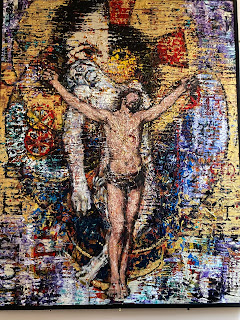The Emerging Role of Church, Part 1 (Walking into the Mystery of God)
Photo by Skull Kat on Unsplash
Read: Galatians 2:19-21
Once a year or so, I have the opportunity to visit the church I was raised in. Although the church has changed greatly since my time there, it still feels like home. The buildings where I attended Sunday School, the Fellowship Hall where I went to youth group, these are all gone now, something different in their place. It contains the shell of what was but has grown into something new. Yet, the purpose of this church was never to stay the same through the years. It was, and still is, to equip people, like me and so many others, to live a life in God, to be a platform for walking into the great mystery that is God.
The church as we have come to know it, the church that raised and shaped many of us is changing…rapidly. Lately I have been reflecting on what the role of the church will be in these changing times. In my time of listening, I have discerned three main roles for the church: 1. Walk with people into the great Mystery that is God; 2. Help people grow in the likeness of Christ; and 3. Embody/reflect the Kingdom of God through acts of love, compassion, and justice. For the next few weeks, I will reflect on one of these roles. I begin today with Walking into the Great Mystery of God.
The author and monk Richard Rohr wrote about two halves of the spiritual life in the book Falling Upward. The first half is all about building up our individual and group identities. As we do so we are passionate about defending, proving, asserting, protecting what we believe and know. There is a great need for certainty and demonstrating we are right and that our experiences are true. The first half of the spiritual life is often about learning rules, creeds, rituals, doctrines, law and then vigorously defending them. We think our way is the right way and maybe even the only way. We select passages of scripture to back up and defend our ideas as way to protect a perceived identity.
The first half is necessary for creating a foundation or “building a container”, as Rohr calls it. The second half of the spiritual life is very different, though. In the second half, we discover such a confidence in the love and grace of God that it is no longer necessary to prove our worth or correctness to others. Our identity is rooted in God and we can live freely in that love without having to force our ways of thinking or experiences onto others. We are more open to mystery and comfortable not having all of the answers. We see God’s goodness beyond our own tradition and ideas. Our posture in the world is to live with eyes wide open to God’s beauty that cannot be contained in any one person, denomination, religion, or way of thinking. As Jesus said, “the Spirit blows where it will” (John 3:8)
The problem is that many of us enter the first half of the spiritual life and remain there. We don’t see that maturity calls us to grow beyond it. This is part of Paul’s realization in the Galatians passage above. He was raised in the strict Pharisaic Jewish tradition. He knew the Scriptures and laws and was zealous in defending them. In time, though, Paul met the risen Jesus who pushed him beyond the “container” he built in the first half of his life. His life shifted from defending his faith to trusting in the love of Christ and following the wild and unpredictable leadings of the Holy Spirit. His story shows the two halves of the Spiritual life.
Similarly, one important role of the church today is to help people form and grow into a Christ-like identity. It is to help people learn the stories and teaching of scripture, to build a solid container for our lives. Yet it also to help spiritual people grow from the first half into the second half of the spiritual life. The church is not a consumer-based entity called to entertain or “give the people what they want”. It is not called to be a repository for memories and nostalgia, staying the same for all time. The church is to help people grow into maturity with God, into the freedom of that second half of the spiritual life; in essence, to walk with people into the great mystery of God.
Notice I talk about this role as walking “with” others. This is because the church is about being fellow pilgrims with one another. We journey together. It is not simply about telling others where to go or what to do. As a community of people seeking God, we walk together into the great Mystery that is beyond us all. We grow together.
Where are you in the spiritual life? First half? Second half? Somewhere in between? How can the church better prepare people to move from the first to the second half of the spiritual life?



Comments
Post a Comment